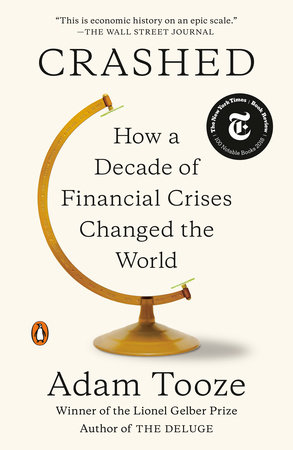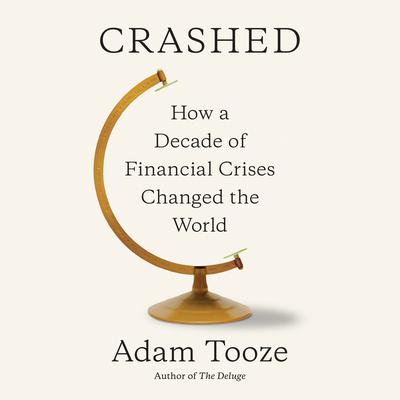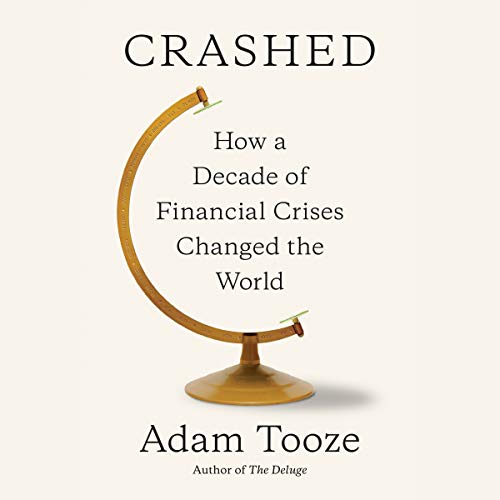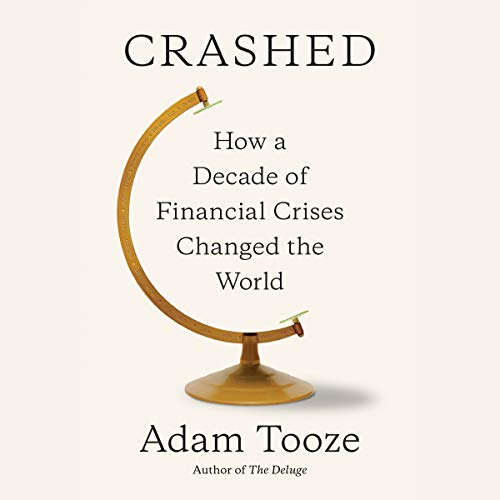Adam Tooze’s “Crashed” audiobook delves into the 2008 financial crisis and its global aftermath. It explores the causes and effects with comprehensive analysis.
Adam Tooze’s “Crashed: How a Decade of Financial Crises Changed the World” is a must-listen for anyone interested in modern economic history. The audiobook provides a thorough examination of the 2008 financial crisis, detailing its origins, key players, and far-reaching impacts.
Tooze skillfully breaks down complex financial concepts into understandable narratives. His insightful analysis covers the interconnectedness of global economies and the cascading effects the crisis had worldwide. This audiobook is essential for understanding how financial systems operate and how crises can reshape the global landscape. Whether you’re an economics enthusiast or a curious listener, “Crashed” offers valuable insights and a compelling storyline.
Introduction To ‘crashed’
Adam Tooze is a famous historian. He teaches at Columbia University. He is well-known for his books on economic history. Adam Tooze has a knack for making complex ideas simple.
‘Crashed’ is about the 2008 financial crisis. It explains how the crisis started. The book also explores its impact on the world. Tooze uses clear language to explain difficult concepts. He connects the crisis to political changes. The audiobook is informative and engaging. It helps listeners understand global economics better.

The Genesis Of The 2008 Financial Crisis
The 2008 financial crisis began with risky loans. Banks gave loans to people who couldn’t pay back. This created a housing bubble. House prices went up too fast. Many believed prices would keep rising. They were wrong. The bubble burst, and house prices fell. This led to many defaults on loans. Banks lost money and trust.
There were many warnings. Some experts saw the danger. They noticed banks’ risky behavior. Credit rating agencies missed the risks. They gave high ratings to bad loans. People ignored these warnings. They thought the market was safe. Government officials also missed the signs. They did not act in time. These early signs showed a crisis was near.
Global Impact And Responses
The global financial crisis affected many countries differently. Developed nations faced severe economic downturns. Emerging economies struggled but showed resilience.
In the United States, unemployment rates soared. Europe experienced a sovereign debt crisis. Asia saw a slowdown in growth but managed to recover quickly. Africa felt the crisis through reduced trade and investment.
Governments around the world took varied policy actions. The United States implemented large stimulus packages. Europe focused on austerity measures. Asia used a mix of fiscal and monetary policies.
Central banks played a crucial role. They cut interest rates and injected liquidity. These actions helped stabilize the financial systems. International organizations like the IMF provided support to struggling nations.
Key Figures And Institutions
Adam Tooze’s “Crashed Audiobook” delves into the 2008 financial crisis, spotlighting pivotal figures and institutions. It offers a comprehensive analysis of the roles played by key economic players.
Leadership During The Crisis
Strong leaders were crucial during the financial crisis. Ben Bernanke, the Federal Reserve chairman, played a key role. He used bold measures to stabilize the economy. Timothy Geithner, the Treasury Secretary, also made significant efforts. They worked with other leaders to prevent a total collapse. Their decisions shaped the recovery process.
Role Of International Institutions
International institutions were vital during the financial crisis. The International Monetary Fund (IMF) provided emergency funds. The European Central Bank (ECB) took actions to support eurozone countries. These institutions helped maintain global economic stability. They coordinated with national banks to manage the crisis.
Analyzing The Aftermath
Many countries faced a slow economic recovery. Jobs were lost and businesses closed. Governments had to spend a lot of money. This helped some people, but not everyone. Some industries bounced back quickly. Others took years to recover.
People had to adapt to new jobs. Many learned new skills. Economic growth was uneven across regions. Some areas thrived while others lagged. Global trade also changed. New rules and tariffs came into play.
The crisis left long-term consequences. Debt levels rose dramatically. This affected future budgets and spending. Social programs faced cuts. Health services also felt the impact.
Trust in financial systems was shaken. People questioned banks and governments. New regulations were introduced. These aimed to prevent another crisis. Economic policies were also reviewed and adjusted.

Critiques And Praise For ‘crashed’
Critics praise Adam Tooze’s deep research in ‘Crashed’. The book explores the 2008 financial crisis with great detail. Academics appreciate its comprehensive analysis. Some find it dense but insightful. Professionals commend its relevance to today’s economy. The audiobook version is noted for its clear narration. It makes complex topics understandable.
Readers find ‘Crashed’ engaging and informative. Many appreciate its easy-to-follow style. Some think it’s too detailed. Yet, most agree it is worth the time. The audiobook format is popular for on-the-go listening. Positive reviews highlight its depth and clarity. Negative reviews often mention its length. Overall, public reception is largely positive.
Themes And Insights
Adam Tooze explores how globalization impacts the world. He explains the economic shifts and social changes. Many people feel left behind. Jobs move to other countries. Local industries suffer. This creates frustration and anger. Global trade grows, but not everyone benefits. Tooze highlights the winners and losers of globalization.
Tooze examines the financial systems in different countries. He shows how inequality grows over time. The rich get richer while the poor struggle. Banks and governments play a big role. They make policies that help the wealthy. Ordinary people face more challenges. Tooze argues for better regulation and fairer policies. This can help reduce economic inequality.
The Legacy Of The Crisis
Adam Tooze’s “Crashed” audiobook delves into the intricate aftermath of the financial crisis. Explore the profound impacts and global repercussions in this compelling narrative.
Lessons Learned
The crisis taught us many lessons. Banks are not always safe. Governments had to step in and help. Many people lost jobs and homes. This showed us the risks of bad decisions. We learned the importance of strong rules. These rules can protect us from future problems. Everyone should understand how money works. This helps us make better choices. The crisis made us think about safety.
Impact On Future Policy Making
The crisis changed how policies are made. Leaders now focus on safety and rules. They want to avoid another crisis. New laws were created to protect people. Banks must follow stricter rules. Governments watch them closely. This helps stop risky behavior. Policies now aim to be fair and clear. Leaders learned that quick action is key. They work together to keep the economy strong. These changes help build trust.

Conclusion
Adam Tooze’s “Crashed” audiobook offers deep insights into the financial crisis. It’s a must-listen for history and economics enthusiasts. This compelling narrative helps understand complex global events. Dive into this audiobook to gain valuable knowledge and perspective. Don’t miss out on this enlightening experience.



